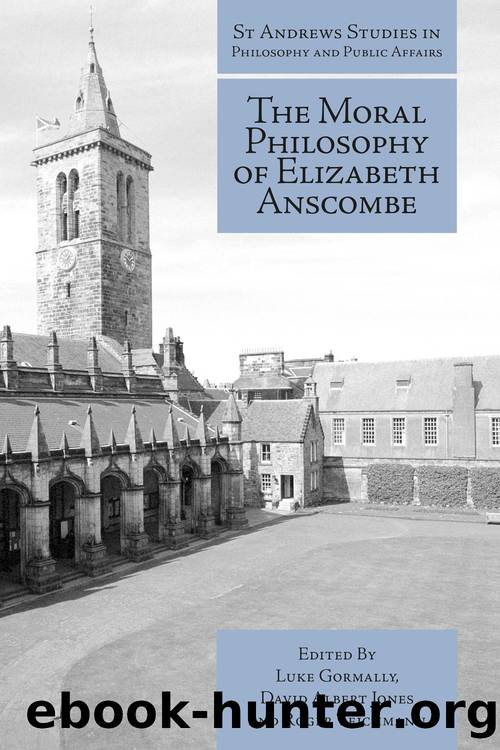The Moral Philosophy of Elizabeth Anscombe by unknow

Author:unknow
Language: eng
Format: epub
Tags: Anscombe, moral philosophy, values, reasons for action, virtue, ethics, conscience, double-effect, murder, sexual ethics, spirit, good, architectonic good, truth, action theory, obligation, law, killing, just war, human embryo, life, lying, sincerity, moral education, belief
ISBN: 4461440
Publisher: Andrews UK Ltd.
Published: 2016-03-16T22:00:00+00:00
2 CPP3, pp. 30â55 (the paper was originally published in 1978). As she remarks in the Introduction to that volume: âI would have said I got interested in political philosophy in the 1970s simply out of an interest in the concept of murderâ (p. vii).
3 HLAE, pp. 261â277 (the paper was originally published in 1982).
4 See unpublished lecture, âKilling and Murder: Introductoryâ (AIA 511, p. 2): âNowadays if this question is asked [âIs that sign, the strict commandment {i.e. the prohibition of murder}, a false sign?â], someone will say that the word âmurderâ simply means impermissible killing. If that should be true, âThou shalt do no murderâ only means âThou shalt not kill human beings in cases where thou shalt notâ. Then the commandment, however venerable, will be no sort of contribution to an argument that something is damnable because it is murder. For it will always first have to be determined that the killing of someone is wrong before it can be determined whether it is murder, and so it cannot effectively be argued that it should not be done because it is murder. It will also cease to be a substantial question whether it can be justifiable to murder.â See further AIA 298, pp. 4â5: âThere is an inclination to imagine a strong case for justifying a particular killing, from the point of view only of the urgently felt desirability of the consequences in the particular situation. If we let the existence of an at least discussable case for killing someone on such grounds imply that perhaps the act is not to be called âmurderâ, then we are surreptitiously undermining a certain pattern of reasoning about conduct. The pattern goes like this, where some here-and-now proceeding or plan is in question:
1. To do that would be to do such and such.
2. Such an action is, or of this kind is, or in these circumstances is: dishonest/ cruel/cowardly/an act of treachery/adultery/theft/murder/etc.
3. Therefore to do that in this case would be to commit an act of dishonesty or cruelty or ... etc. ...
This is a powerful piece of practical reasoning. I mean a will not to be dishonest, cruel, cowardly, a thief, adulterous, treacherous or murderous may very well exist, and where there is such a will, the possessor of it will tend to be moved by this reasoning. It undoubtedly can have a strong effect on the mind to be forced to contemplate oneâs proposed actions under descriptions of this sort, the applicability of which may be arguable or evident from the undeniable circumstances of the case.â
Download
This site does not store any files on its server. We only index and link to content provided by other sites. Please contact the content providers to delete copyright contents if any and email us, we'll remove relevant links or contents immediately.
The remains of the day by Kazuo Ishiguro(8961)
Tools of Titans by Timothy Ferriss(8359)
Giovanni's Room by James Baldwin(7313)
The Black Swan by Nassim Nicholas Taleb(7097)
Inner Engineering: A Yogi's Guide to Joy by Sadhguru(6782)
The Way of Zen by Alan W. Watts(6589)
Asking the Right Questions: A Guide to Critical Thinking by M. Neil Browne & Stuart M. Keeley(5751)
The Power of Now: A Guide to Spiritual Enlightenment by Eckhart Tolle(5741)
The Six Wives Of Henry VIII (WOMEN IN HISTORY) by Fraser Antonia(5493)
Astrophysics for People in a Hurry by Neil DeGrasse Tyson(5172)
Housekeeping by Marilynne Robinson(4432)
12 Rules for Life by Jordan B. Peterson(4298)
Double Down (Diary of a Wimpy Kid Book 11) by Jeff Kinney(4257)
The Ethical Slut by Janet W. Hardy(4235)
Skin in the Game by Nassim Nicholas Taleb(4231)
Ikigai by Héctor García & Francesc Miralles(4228)
The Art of Happiness by The Dalai Lama(4118)
Skin in the Game: Hidden Asymmetries in Daily Life by Nassim Nicholas Taleb(3985)
Walking by Henry David Thoreau(3948)
